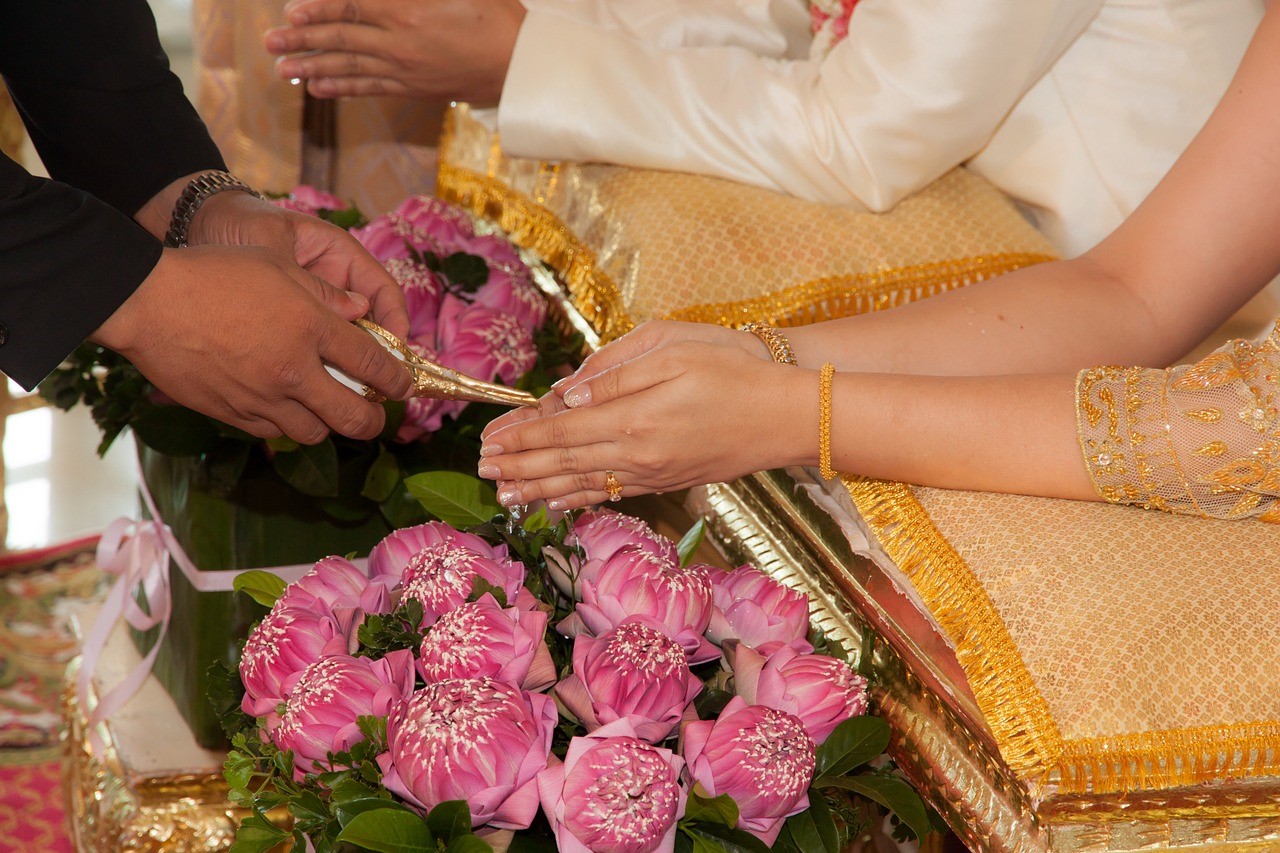[Global Series: Marriage and Assets] Indonesia: Preparing for Marriage
- Release date: Aug 23, 2022
- Update date: Oct 15, 2025
- 10267 Views
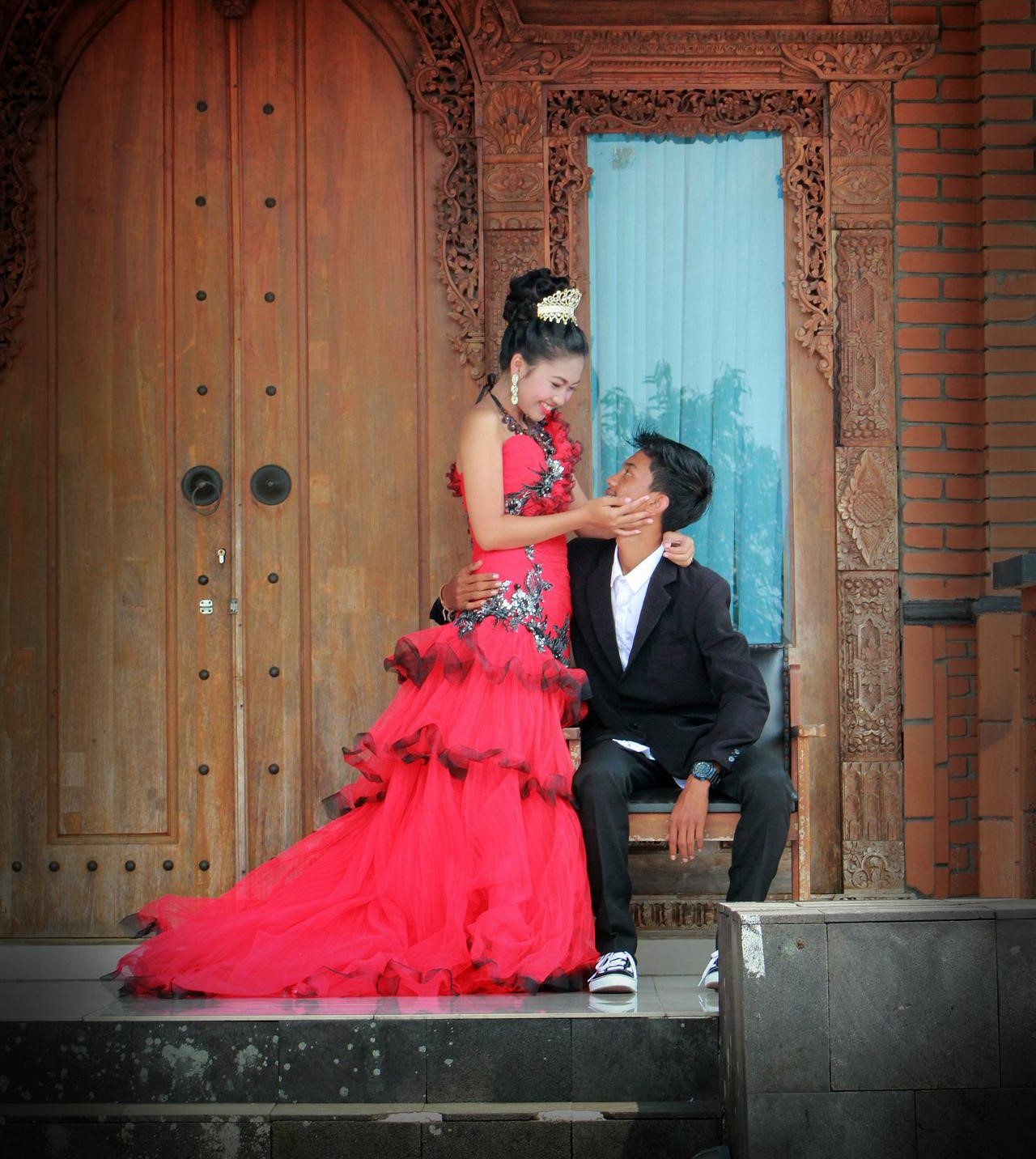
Indonesia's economic growth continues. The minimum wage rises by 5 to 8 percent annually. With growing career aspirations and an increase in people quitting corporate jobs to start small businesses following the pandemic, living standards are gradually improving. While late marriage is said to be more common than before, the belief that marrying early is preferable remains deeply ingrained. By their mid-20s, many seek marriage partners through introductions by friends, arranged meetings (introduced by parents or relatives), or matching apps. Since both men and women strongly equate dating with marriage, the Japanese pattern of dating for a long time before marrying is less common.
Religion and Marriage
To get married in Indonesia, you must complete two procedures: a “religious marriage” and a “civil marriage registration.” The process involves first conducting a religious marriage according to the rules of your respective religion. After obtaining the religious marriage certificate, you then apply at the local government office to have a marriage certificate issued. This completes the marriage registration process. Depending on the religion, Muslims must pay a dowry (mahr) during the religious ceremony. While called “gold,” this can be cash, non-gold jewelry, household goods, land, cattle, goats, or anything else. The item given is recorded on the marriage certificate. The wedding ceremony is held at the respective religious facility: a mosque for Muslims, a church for Christians, and a temple for Buddhists and Hindus. There is no fixed cost; the groom pays the officiant according to his means. (The ceremony can also be held elsewhere as long as a representative from the Ministry of Religious Affairs and a guarantor are present.)
Wedding funds
In Jakarta's urban areas, a slight increase has been seen in couples renting hotels or venues for their weddings, though many still uphold tradition by holding the ceremony at the bride's family home. While it's customary for the groom's side to prepare the funds, in practice, it's generally the family with greater financial means that covers the costs. Indonesian weddings are not seated dinners but rather standing buffet-style receptions. Guests are welcome to arrive and depart anytime during the 3 to 5 hours the wedding party lasts. Anyone can attend—not just those who received an invitation—including family, relatives, friends, couples, and neighbors. The number of attendees can be 3 to 4 times the number of invitations sent, so the venue, food, and wedding favors must be prepared accordingly.
In Jakarta, many women are career-oriented.
While the situation differs between rural areas and cities, many women working in Jakarta—regardless of ethnicity or religion—are highly career-oriented, and a large number continue working even after marriage and childbirth. With an environment where it is relatively easy to hire domestic help, and where there are many daycare centers and preschools that accept children from as young as six months, marriage, childbirth, and having children do not put women at a disadvantage in terms of their careers from a societal perspective. As a result, even if women leave their jobs temporarily after giving birth, most return to work.
Among lower- and middle-income households, the issue is often less about career ambition and more about the high cost of living in Jakarta, which can make it difficult to get by on a single income. In such cases, it is common for couples to leave their children with grandparents in their hometowns, while both parents work in Jakarta and send money home.
Purchasing a home, car, furniture, etc., around the time of marriage
Indonesia's birth rate has been gradually declining, yet many people still want children soon after marriage. It's common to see couples considering purchasing a car or a detached house at the same time they get married. Even if they buy an apartment, they don't own the property outright; they only have usage rights (requiring renewal every 15 years). Consequently, many people are willing to stretch their finances to purchase a detached house with land, which becomes a permanent family asset. However, land in central Jakarta is expensive and difficult to purchase. Consequently, many people buy detached houses in Jakarta's suburbs and commute for over an hour by motorcycle, car, or bus. In Indonesia, mortgage repayment periods are short, with a maximum of 15 years. Interest rates range from 7% to 9%, and the down payment is high at 30%. Housing purchase funds are often provided by the parents of either the husband or wife (typically the wealthier family).
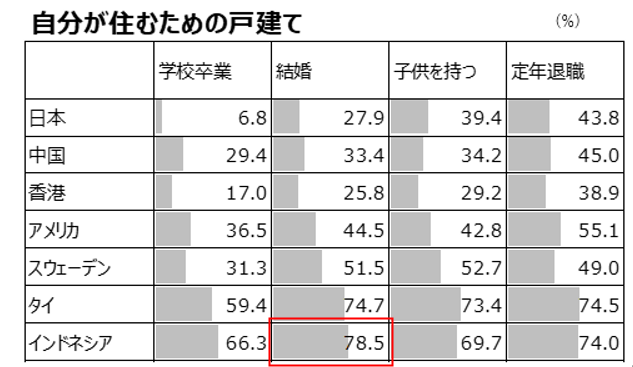
Many people wish to purchase a detached house with land.
Q7 For each of the following life stages, please select what you would like to have. (1) When you graduate from school and start working (2) When you get married (3) When you welcome your first child (4) When you retire
Source: Intage Independent Survey (Survey on Life Events and Assets in 9 Countries) URL: https://www.global-market-surfer.com/report/detail/152/
Many people purchase large appliances and slightly more expensive furniture at the same time as getting married or buying a home. Reasons include frequently inviting parents, relatives, and friends over, as well as the fact that while single, they either lived with their parents, rented a furnished studio apartment, or lived in a cos (shared house), meaning they didn't own their own furniture or appliances.
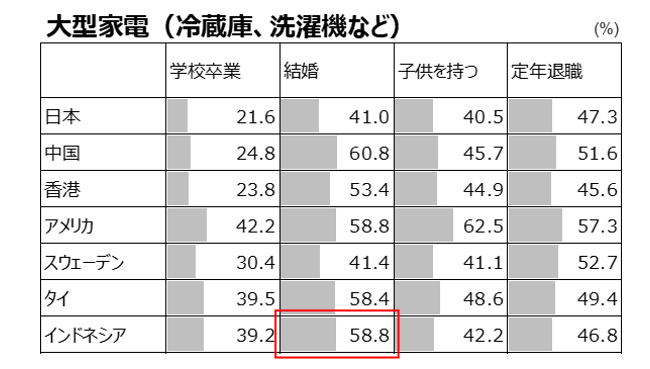
In addition to large home appliances, 44.7% of people also purchased furniture.
Q7 For each of the following life stages, please select what you would like to have. (1) When graduating from school and starting work (2) When getting married (3) When welcoming your first child (4) When retiring
Source: Intage Independent Survey (Survey on Life Events and Assets in 9 Countries) URL: https://www.global-market-surfer.com/report/detail/152/
Many people purchase a car upon getting married, and family cars (8-seaters) priced around 270 million rupiah (approximately ¥2.5 million) that can accommodate large groups of family and relatives are popular. Car prices in Indonesia are higher than in Japan, and maintenance costs like taxes and insurance are also expensive. Therefore, it's common for people to receive financial assistance from their parents, similar to buying a house. Additionally, Indonesia suffers from severe traffic congestion, so many people also own a motorcycle for convenient commuting. Many Muslims, particularly men, purchase gold wedding rings but do not wear them. The left hand is considered unclean, so women wear their wedding rings on the right ring finger. High savings in the local Indonesian currency, the rupiah, are seen as high risk. Many prefer gold, gold bullion, land, stocks, or investment trusts. Gold and gold bullion are considered convenient because they can be sold quickly when money is needed.
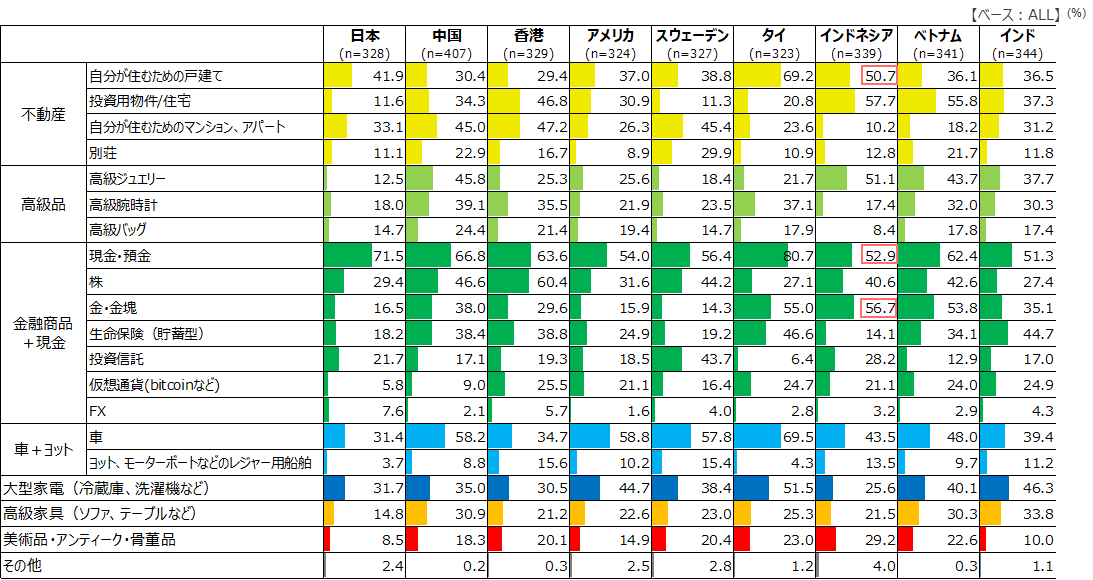
There is a stronger preference for land, single-family homes, gold, and gold bullion than for cash and deposits.
Q1 Please list the assets you believe enrich your life. From those, select up to three assets you consider particularly important for enriching your life.
Source: Intage Independent Survey (Survey on Life Events and Assets in 9 Countries) URL: https://www.global-market-surfer.com/report/detail/152/
Indonesia places strong importance on both ethnic culture and religious customs. When it comes to marriage and wedding preparations, not only the couple themselves but also their families willingly invest money, time, and effort. Marriage is regarded as a major life event, and many people even hold wedding ceremonies when remarrying.
By contrast, weddings limited to only legal registration or very modest ceremonies attended only by parents and siblings are quite rare. These characteristics surrounding marriage in Indonesia are likely to continue for some time, even as generations change.
What is Consumer Life Panorama?
This is a website-type database that has accumulated visual data on more than 1,000 sei-katsu-sha from 18 countries around the world. The database includes many 3D models of living environments and 2D data of items owned by each sei-katsu-sha, and is useful for understanding overseas sei-katsu-sha, which is difficult to grasp using only letters and numbers.
Using visual data such as those cited in this column,
Compare the differences in the attributes of overseas consumers
To get a realistic understanding of the actual usage of each category
To understand the overall lifestyle of target consumers
etc., can be utilized as a “no-go” home visit survey.
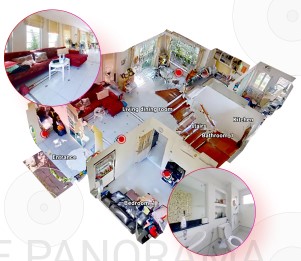
-

Author profile
TNC Lifestyle Researcher
The “Lifestyle Researchers” network, operated by TNC Inc., comprises 600 Japanese women living across 100 regions in 70 countries worldwide. They uncover trends invisible in statistics and capture authentic voices from everyday life. Based on this raw information, we provide proposals for solving corporate challenges and develop product concepts. https://www.tenace.co.jp/
Profile: Based in Jakarta, Indonesia for 17 years. Shares insights on Indonesian trends, food, and culture through the TNC Asia Trend Lab. Married to an Indonesian partner for 10 years, enjoying an even deeper immersion in Indonesian life.
-

Editor profile
Chew Fong-Tat
I am a Malaysian researcher. I came to Japan 15 years ago and am still based in Tokyo, sharing insights about Southeast Asia and other overseas markets.
 Global Market Surfer
Global Market Surfer CLP
CLP
